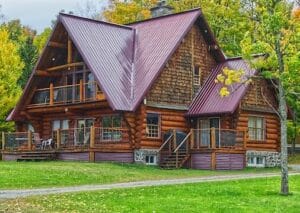The popularity of foreigners buying property in Canada is fueled by the high standard of living from economic stability and a resilient property market to cultural diversity and generous social programs. If you’re considering investing in Canadian real estate, this guide will steer you through the ins and outs of the process, from purchase price to taxes and everything in between.
Purchase Property in Canada: How much does it cost?
If you envision owning Canadian property, understanding the financial landscape is a vital first step. An intricate web of factors, including property type, location, market conditions, and associated costs such as taxes, fees, down payment, and more influences the purchase price of property in Canada. Let’s embark on a detailed exploration of the cost considerations of buying real estate in the Great White North.
The purchase price of Canadian property: A diverse landscape
The Canadian real estate market is as diverse as the nation itself. The cost of purchasing property varies significantly depending on whether you’re eyeing a downtown condo in Toronto, a picturesque cottage in the Muskoka region, a family home in Vancouver, or a quiet retreat in the Maritimes. To provide you with a snapshot, as of the most recent data available, the average purchase price of real estate in Canada hovers around CAD $716,828.
Understanding regional dynamics
The concept of “location, location, location” holds a considerable influence on the purchase price of residential homes. Metropolitan areas such as Toronto, Vancouver, and Montreal often command higher prices due to their urban amenities, economic opportunities, and cultural offerings. In contrast, rural regions and smaller communities generally offer more affordable housing options. The market conditions in these areas, influenced by factors like local job opportunities and lifestyle preferences, contribute to varying purchase prices.
Additional costs: Going beyond the purchase price
Purchasing property entails more than just the sale price for foreign investors. Potential homeowners must consider a range of associated costs that contribute to the overall financial commitment. These include:
• Property taxes: Asset tax returns are a crucial consideration and vary depending on the province and municipality. They fund local services such as schools, infrastructure, and public amenities.

• Down payment: The down payment is a percentage of the property’s price that you pay upfront. It’s a critical factor in determining your mortgage terms and interest rates.
• Closing costs: Closing costs encompass a range of expenses, including title insurance, and home inspections. These costs can add up, so it’s important to budget for them.
• Mortgage payments: If you’re financing your purchase through a mortgage, your home loan mortgage payments will depend on factors like the mortgage rate, term, and amortization period.
Navigating financing: Canadian banks and mortgage rates
For most buyers, a significant portion of the property price is financed through a mortgage from a Canadian bank based on taxable income. The banks in Canada offer mortgage financing to both a Canadian citizen and foreign permanent residents with a valid bank account in Canada. However, the terms and conditions may differ for the latter group. Your creditworthiness, income, and down payment amount will influence the interest rate you’re offered from the housing corporation. As of now, Canadian mortgage rates are relatively low, making homeownership an attractive prospect for individuals with a good credit history.
Regional nuances: Different approaches for permanent and temporary residents
The real estate industry offers a relatively straightforward path to buy a home in Canada and start homeownership for Canadian citizens and permanent residents. However, for non-Canadians and temporary residents, specific considerations are issued by housing corporations and the Canadian government. The Non-Canadians Act outlines regulations regarding property ownership for non-Canadians. Temporary residents may need to apply for approval from the Canadian government to buy property.
Rules for Americans Buying Estate in Canada
For our American neighbours considering the allure of Canadian property market, the process of purchasing properties in the Great White North can seem like a dream come true. The good news is that Canada welcomes foreign buyers to buy home in Canada or invest for business, including Americans. However, there are certain rules and procedures to navigate, ensuring a smooth and legally sound transaction. Let’s delve into the intricacies of the rules for Americans purchasing estate in Canada and make your cross-border property ownership and realtor aspirations a reality.
Non-resident ownership: A welcoming environment
Canada’s real estate market is open to foreign buyers to buy home in Canada, and this includes citizens of the United States. There are no restrictions on non-Canadian ownership, which means that as an American, you have the same property rights as Canadians. This welcoming environment has contributed to Canada’s popularity as a destination for international property buyers.
Understanding the process: Procedural insights
While there are no prohibitions on Americans buying Canadian properties, there are certain procedural steps to follow. These steps are designed to ensure that the purchase and sale process aligns with Canadian laws and regulations:
Financing: If you’re planning to finance the purchase through a mortgage from a Canadian bank, you’ll need to communicate with relevant banks in Canada and open a bank account. Some American buyers may also consider paying cash for their properties.
Non-Resident Tax Number: As non-Canadians, you’ll need to obtain a Tax Number for non-residents from the Canada Revenue Agency (CRA) to pay tax. This number is required for various tax-related transactions, including the purchase of property.
Tax considerations: While non-Canadian residents are subject to certain tax implications, there are ways to optimize your tax-deductible amount. Consult with a tax professional who specializes in cross-border property transactions to understand the tax obligations in both the US and Canada.
Buyer’s market: Depending on the current market conditions, you might find yourself in a buyer’s market for buying a home, where there are more properties available than buyers. This can offer opportunities for negotiation and potentially favorable terms especially if you are looking at resale homes.
Real estate agent and lawyer: Engaging a real estate agent familiar with the Canadian market is highly recommended if you want to buy a home in Canada. They can provide insights into local market trends and help you find properties that align with your preferences. Additionally, having a Canadian property lawyer review the purchase agreement and guide you through legal requirements is crucial.
Currency exchange: Given that the price and other costs will likely be in Canadian dollars, you’ll need to consider currency exchange rates. Fluctuations in exchange rates can impact the overall cost of your property purchase.
Residency and investment: Two distinct paths
It’s important to differentiate between buying a home in Canada as a permanent residence and a person purchasing property for investment purposes:

• Investment: If your goal is to invest in real estate in Canada without becoming a permanent resident, you’re free to do so. Many foreign investors choose to buy a home in Canada for rental income, like vacation homes, resale homes, or long-term capital gains.
Is purchasing a house cheap in Canada?
While “cheap” is a relative term, Canada offers a range of options to suit various budgets. Some regions, particularly in less densely populated areas, offer more affordable housing markets and a lower cost of living in Canada compared to the bustling urban centers of the country. This diversity makes it possible to find a dream home that aligns with your financial goals. Researching different provinces and cities will help you find a location that matches your budget for buying a home.
Factors affecting house prices:
- Location: Census metropolitan areas like Toronto and Vancouver have higher prices due to demand and amenities.
- Market conditions: Buyer’s or seller’s market affects pricing dynamics.
- Property type: Condos, single-family homes, and rural properties have varying costs.
- Provincial variation: Prices differ by province due to economic factors.
Affordable options:
- Rural areas: Less populated regions offer more affordable housing.
- Smaller cities: Urban centers outside major metros can have lower prices.
- Market trends: Monitoring price trends helps find good deals.
Budget considerations:
- Diverse range: Options for various budget ranges.
- Financing: Mortgage rates and terms influence affordability.
- Property size: Smaller homes or condos can be more budget-friendly.
Investment potential:
- Long-term gain: Buying in growing areas can lead to value appreciation.
- Income properties: Rental properties can offset costs and generate income.
- Research: Investigate market trends for investment potential.
Buying Property in Canada: Property Tax Considerations
When it comes to buying a home in this nation, understanding the various property tax considerations and any new law associated with it is crucial. Taxes are an integral part of homeownership, contributing money to local services and infrastructure development. As a potential property buyer, comprehend the types of property taxes you may encounter, and their implications can help you make informed decisions. Let’s delve into the world of property taxes in Canada, exploring different types, their calculation methods, and how they factor into your real estate investment.
Types of property taxes: Diverse landscape
There are several types of taxes that the government can apply, each serving distinct purposes:
Municipal Property Tax: This is the most common type of property tax and is levied by the local municipality. The tax amount is based on the assessed value of the property and is used to fund various local services, such as schools, parks, road maintenance, and waste management.

Provincial Land Transfer Tax: This tax is paid by the buyer upon purchasing a property. The amount varies by province and is calculated based on the property’s buying price. Some provinces offer exemptions for first-time homebuyers.
Goods and Services Tax (GST) or Harmonized Sales Tax (HST): New homes may be subject to GST or HST, depending on the province. In some cases, there are rebates available for new homebuyers to offset these taxes.
Capital Gains Tax: While not a property tax per se, capital gains tax may apply when you sell a property. The amount of tax depends on the difference between the property’s buying price and its sale price, minus eligible expenses.
Reducing taxes: Home Buyers’ Plan
The Canadian Home Buyers’ Plan (HBP) is an initiative to reduce first-time buyers’ taxes. Canadians and permanent residents can withdraw up to CAD 35,000 tax-free from their registered retirement savings plan (RRSP) to contribute toward the price of building or buying an eligible home.
Calculation methods and payment periods
Taxes are typically calculated based on the assessed value of the property and the mill rate set to pay tax on by the municipality. The mill rate is a tax rate applied per $1,000 of assessed value. For example, if the assessed value of your property is $500,000 and the mill rate is 5, the property tax would be calculated as (500,000 / 1,000) * 5 = $2,500.
Property tax payment periods vary by municipality. Some areas collect taxes annually, while others may have semi-annual or quarterly payment schedules. It’s important to be aware of the payment period and due dates to avoid late payment penalties.
Navigating property tax as a buyer
As a potential property buyer, understanding how taxes factor into your investment is essential:
- Budgeting: Taxes are a recurring expense that can significantly impact your monthly housing costs. When budgeting for homeownership, consider the estimated property tax amount along with other expenses like mortgage payments, insurance, and maintenance.
- Local variations: Property tax rates can vary widely between municipalities. Larger cities may have higher property tax rates due to the availability of services and amenities. Researching property tax rates in your desired location can help you anticipate costs.
- Tax increases: Property tax rates can change over time due to factors such as municipal budget decisions and infrastructure projects. Be prepared for potential tax increases in the future.
- Exemptions and rebates: Some provinces offer property tax exemptions or rebates for specific groups, such as seniors or low-income homeowners. Investigate whether you qualify for any of these programs.
How easy is it to buy a house in Canada?
The ease of home purchases in the country largely depends on your preparedness and understanding of the process. Engaging a real estate agent who specializes in your desired location, understanding local market trends, arranging financing, and conducting thorough due diligence can make the process smoother. The following steps can make the entire process easier and smoother for every buyer:
Property
Search
Offer and Negotiation
Due
Diligence
Purchase Agreement
Closing
Process
Property Transfer
- Property search: Browse listings, attend viewings, and identify suitable options that match your criteria. Property agents can provide a selection of properties tailored to your preferences.
- Offer and negotiation: Making an offer through your agent is a key step. Negotiations may occur, and having a professional negotiator on your side can optimize your deal.
- Due diligence: Conduct thorough home inspections to identify any potential issues. Reviewing the property’s history can reveal valuable insights about its maintenance and previous ownership.
- Purchase agreement: Signing a purchase agreement is a legally binding step that outlines terms and conditions. It’s crucial to have a clear understanding of the contract’s contents.
- Closing process: Finalize your mortgage arrangements, transfer ownership, and pay finalizing costs. This involves coordinating with your lender, lawyer, and other parties involved.
- Property transfer: As the title and ownership are transferred, the property officially becomes yours. This step involves legal processes to ensure a smooth transition.
Challenges and considerations
- Competition: Desirable areas may experience high competition. Being prepared to act swiftly or consider alternative neighbourhoods is advisable.
- Closing costs: Beyond the property price, factor in additional expenses like legal fees and inspection costs.
- Local regulations: Each province has distinct property regulations. Understanding these rules helps you navigate potential challenges smoothly.
How can US Citizens buy commercial/residential estate in Canada?
As a US citizen, you have the same property rights as Canadians. The process involves finding a property, making an offer, conducting due diligence, and finalizing the transaction. Americans moving to Canada can finance their purchase by reaching out to Canadian banks or using a US lender if they offer cross-border services for the USA and Canada. Consider the steps below for a better understanding of the process:
Understanding the Canadian property landscape:
- Market research: Start by researching the specific region where you plan to invest. Each province has its own market dynamics, property values, housing corporations, and regulations.
- Property professionals: Engage with local estate agents who possess deep knowledge of the area. They can provide valuable insights and assist in property searches.
Financing options and currency considerations
- Mortgage eligibility: US citizens can secure mortgages from Canadian banks, although the terms and conditions for Canada mortgage might differ from those for Canadian residents.
- Currency exchange: Keep an eye on currency exchange rates, as your funds will need to be converted from US dollar to Canadian dollar.
Legal aspects and documentation:
- Legal representation: Hiring a property lawyer is crucial for a smooth transaction. They will review contracts, ensure legal compliance, and safeguard your interests.
- Due diligence: Perform thorough property inspections to assess its condition and legal status, including any existing liens or encumbrances.
Property ownership rights for US citizens:
- No ownership restrictions: US citizens have the same property ownership rights as Canadian citizens. You can buy both commercial and residential properties with ease.
- Tax implications: Consult tax professionals who specialize in cross-border transactions to understand potential tax liabilities or tax breaks in both countries.
Buying commercial property:
- Business structure: Determine the appropriate business structure for property ownership, considering factors like liability and tax implications.
- Zoning and regulations: Ensure that the property is zoned for commercial use and complies with local regulations.
Buying residential property:
- Residency considerations: Purchasing residential property doesn’t automatically grant you Canadian residency. Separate immigration processes apply for long-term stays.
- Investment vs. primary residence: Clarify whether the property is intended for investment purposes or as your primary residence.
Government approvals and regulations:
- Non-residents’ approval: In some provinces, buyers who are non-Canadians need government approval to purchase real estate. Research the specific regulations in your chosen province.
- Foreign Investment Review Act (FIRA): Understand the provisions of FIRA, which regulate foreign investment in certain types of Canadian properties.
Due diligence and negotiation:
- Property inspection: Conduct a thorough inspection to evaluate the property’s physical condition and uncover potential issues.
- Negotiation and offer: Engage in negotiation with the seller or seller’s agent, and make an offer that aligns with the market conditions.
Closing the deal:
- Additional costs: Budget for additional costs beyond the property price, such as legal fees, land transfer taxes, and potential agent commissions.
- Title transfer: The transfer of ownership involves legal procedures and documentation that ensure your rights as the property owner.
What to Know about Buying Canadian Property
Ownership Rights: Non-Canadians have the same ownership rights as Canadian citizens. You can own the property, earn rental income, and sell property. |
Financing: Canadian banks offer mortgage financing to non-residents, but terms and conditions may differ. Prepare your financial documentation and explore your financing options with a Canadian bank. |
Property Types: Canada offers a range of property types, including single-family homes, condos, townhouses, and even recreational properties. Choose a type that suits your lifestyle and preferences. |
Finalizing Costs: Be prepared for additional costs beyond the purchase price, such as legal fees, land transfer taxes, and home inspection costs. These costs can add up, so budget accordingly. |
Local Regulations: Each province and municipality has its own regulations regarding property ownership and taxes. Research thoroughly before making a decision to ensure compliance with local laws. |
How Can Global Citizen Solutions Help You?
Global Citizen Solutions is a boutique migration consultancy firm with years of experience delivering bespoke residence and citizenship by investment solutions for international families. With offices worldwide and an experienced, hands-on team, we have helped hundreds of clients worldwide acquire citizenship, residence visas, or homes while diversifying their portfolios with robust investments.
We guide you from start to finish, taking you beyond your citizenship or residency by investment application.

Frequently Asked Questions about Buying Property in Canada
Can a foreigner purchase a house in Canada?
Foreigners living in Canada and overseas can buy property in Canada without any restrictions.
Can I buy property in Canada as a US citizen?
Yes, US citizens can buy real estate in Canada with the same rights as Canadian citizens.
Can foreigners buy real estate in Canada to live?
Yes, foreigners can purchase residential real estate to live in Canada.
Is property cheaper in Canada or the USA?
Property prices vary greatly within both countries, so it depends on the specific location.


